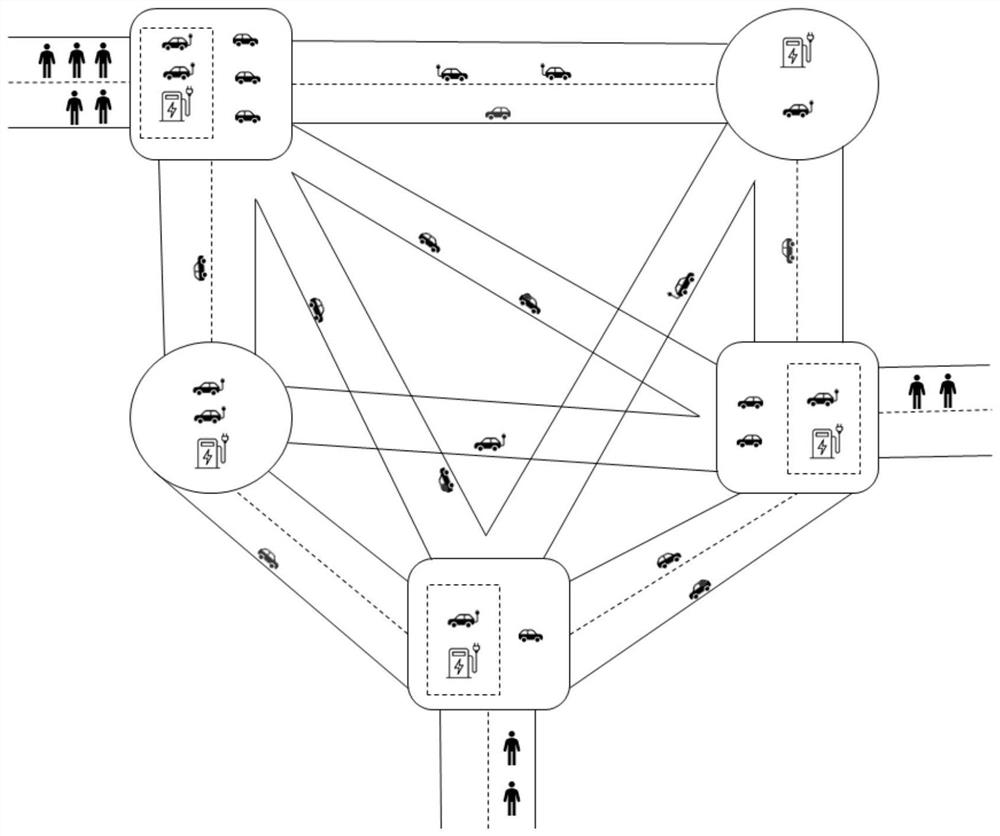AMoD system charging scheduling and vehicle rebalancing method considering riding pricing
A rebalancing and vehicle technology, applied in the direction of instruments, data processing applications, resources, etc., can solve the problems of not fully describing the dynamic change process of the vehicle, not considering the impact, etc., to improve the poor dynamic performance, wide application range, good dynamic Effects of changing traffic conditions
- Summary
- Abstract
- Description
- Claims
- Application Information
AI Technical Summary
Problems solved by technology
Method used
Image
Examples
Embodiment 1
[0306] The parameters in Embodiment 1 are set as follows: Assume that the entire system has 8 customer sites, 4 large charging sites, and each customer site has a small charging station. Customer according to parameter Λ i The Poisson distribution process randomly arrives at each station, and the arrival rate of each station is uniformly randomly selected in the interval [0.5, 0.95], and each time step reaches one unit. The destination distribution of each customer is derived from the distribution p ij obtained by sampling, and p ij Also uniformly randomly generated in the interval [0,1]. The travel time between each station is given by the Euclidean distance, with each vehicle moving 0.2 per unit step. Furthermore, assuming that each PS i The generation rate of low-battery vehicles is directly proportional to the customer arrival rate, that is, Each charging station CS k Has 3 charging piles, each CS k The charging rate is 0.1, 0.1, 0.2, 0.2. CSP per charging stati...
Embodiment 2
[0309]Example 2: Through actual scene analysis, in this case study, the effectiveness of the proposed adaptive method is tested based on the large-scale simulation software AMoDeus and the actual operating data of a rental company. The data set mainly includes the taxi driving trajectory data of a certain city in November 2016, from which we arbitrarily extracted one day's data for scene analysis. The basic road data of the simulation mainly comes from part of the map data of the city center, which mainly includes 46012 roads and 20376 nodes. AMoDeus can use the k-means clustering algorithm to generate stations based on the data set, so there are 50 customer stations and 10 large charging stations in the setup system. In addition, the number of customers in the system is set to 10494, the total number of vehicles in the system is 500, and the system is rebalanced and optimized every 30 minutes. Figure 7 , 8 Shows how customer wait times change over the course of a day. Fro...
PUM
 Login to View More
Login to View More Abstract
Description
Claims
Application Information
 Login to View More
Login to View More - Generate Ideas
- Intellectual Property
- Life Sciences
- Materials
- Tech Scout
- Unparalleled Data Quality
- Higher Quality Content
- 60% Fewer Hallucinations
Browse by: Latest US Patents, China's latest patents, Technical Efficacy Thesaurus, Application Domain, Technology Topic, Popular Technical Reports.
© 2025 PatSnap. All rights reserved.Legal|Privacy policy|Modern Slavery Act Transparency Statement|Sitemap|About US| Contact US: help@patsnap.com



